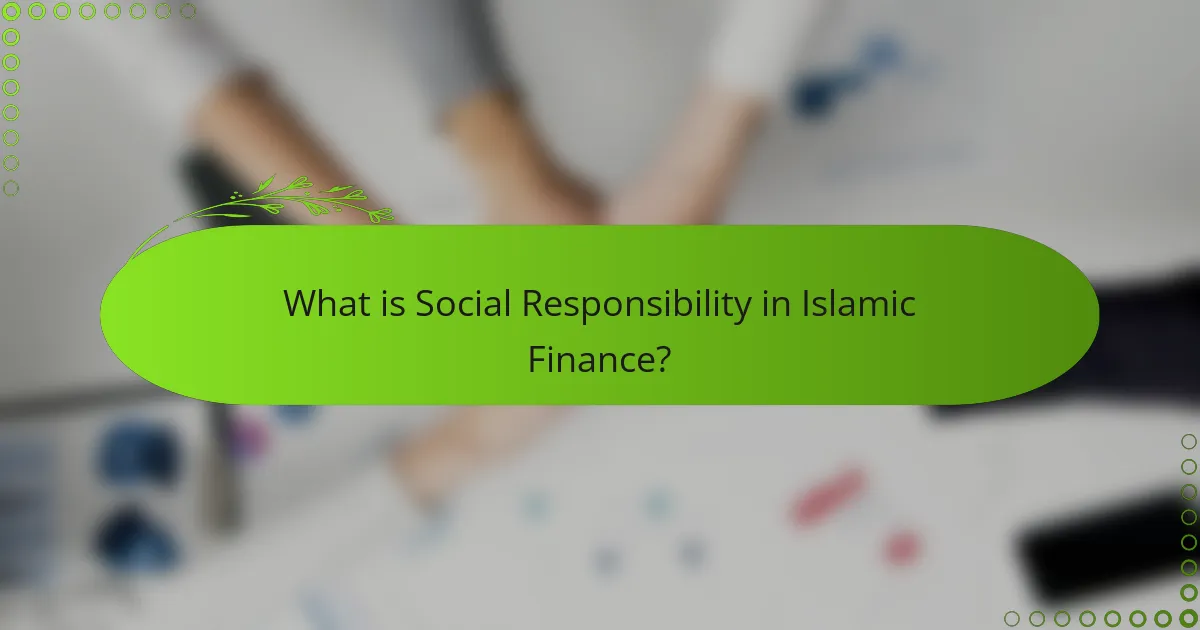
What is Social Responsibility in Islamic Finance?
Social responsibility in Islamic finance refers to the ethical obligation to ensure financial practices align with Islamic principles. This includes promoting social welfare and economic justice. Islamic finance encourages investment in socially beneficial projects. It prohibits investments in harmful industries, such as alcohol or gambling. The concept is rooted in the Islamic belief of accountability to society. Financial institutions are expected to contribute to community development. This approach fosters inclusive economic growth. It emphasizes fairness, transparency, and ethical behavior in financial transactions.
How is social responsibility defined within Islamic finance?
Social responsibility in Islamic finance is defined as the ethical obligation to promote social welfare and justice. This concept is rooted in Islamic teachings, which emphasize fairness, equity, and the prohibition of harm. Islamic finance promotes investments that benefit society while avoiding activities that are deemed harmful or exploitative. The principles of social responsibility are reflected in the concepts of Zakat (charitable giving) and ethical investment. Zakat requires Muslims to give a portion of their wealth to those in need, thereby supporting social equity. Ethical investments in Islamic finance focus on sectors that contribute positively to society, such as healthcare and education. This alignment with social values is essential for the legitimacy of financial practices within the Islamic framework.
What principles underpin social responsibility in this context?
The principles that underpin social responsibility in Islamic finance include justice, transparency, and ethical conduct. Justice ensures fairness in financial transactions, aligning with Shariah law. Transparency promotes clear communication between parties, fostering trust and accountability. Ethical conduct emphasizes moral responsibility in business practices, discouraging exploitation and harm. These principles guide Islamic financial institutions in their operations. They aim to promote social welfare and economic development. Evidence of these principles can be found in various Islamic finance guidelines and frameworks, such as those provided by the Accounting and Auditing Organization for Islamic Financial Institutions (AAOIFI).
How does social responsibility align with Islamic teachings?
Social responsibility aligns with Islamic teachings through the principles of justice, charity, and community welfare. [censured] emphasizes the duty of individuals and organizations to act ethically and contribute positively to society. The concept of Zakat, a form of almsgiving, mandates Muslims to donate a portion of their wealth to those in need. This practice promotes social equity and supports community welfare. Additionally, the Quran encourages acts of kindness and prohibits exploitation and harm to others. Islamic teachings advocate for the fair treatment of all individuals, fostering a sense of responsibility toward societal well-being. These principles collectively underscore the importance of social responsibility in [censured].
Why is social responsibility important in Islamic finance?
Social responsibility is crucial in Islamic finance because it aligns with the ethical principles of Shariah law. Islamic finance promotes justice, fairness, and social welfare. It emphasizes risk-sharing and prohibits exploitative practices like usury. This framework encourages investment in socially beneficial projects. It aims to create economic value while ensuring societal well-being. Moreover, Islamic financial institutions are expected to contribute to community development. Studies show that socially responsible investments can enhance financial performance. This approach fosters trust and stability within the financial system.
What are the potential impacts of social responsibility on communities?
Social responsibility can significantly enhance community well-being. It fosters trust between businesses and local residents. This trust can lead to increased community engagement and participation. Social responsibility initiatives often address local issues, such as poverty and education. For example, companies may invest in local schools or health facilities. This investment improves access to essential services for community members. Furthermore, social responsibility can boost economic development. Businesses that prioritize social responsibility often stimulate job creation and local entrepreneurship. A study by the Harvard Business Review found that socially responsible companies tend to perform better financially. This financial success can further benefit the community through increased local spending and investment.
How does social responsibility enhance the credibility of Islamic financial institutions?
Social responsibility enhances the credibility of Islamic financial institutions by aligning their operations with ethical and moral principles. These institutions are guided by Shariah law, which emphasizes social welfare, justice, and fairness. When they engage in socially responsible practices, they demonstrate commitment to these values. This commitment builds trust among stakeholders, including customers, investors, and the community.
For example, initiatives such as financing for sustainable projects and charitable contributions reinforce their role in societal development. A study by the Islamic Financial Services Board shows that socially responsible investments can lead to higher customer loyalty and satisfaction. Consequently, this loyalty translates into a stronger reputation and increased market share for these institutions.

What initiatives promote social responsibility in Islamic finance?
Initiatives promoting social responsibility in Islamic finance include microfinance programs, ethical investment funds, and social impact bonds. Microfinance programs aim to provide financial services to underserved communities. These programs help alleviate poverty by enabling entrepreneurship and self-sufficiency. Ethical investment funds focus on investing in projects that align with Islamic principles. They avoid industries like alcohol and gambling, promoting socially responsible business practices. Social impact bonds fund initiatives that generate positive social outcomes. They are structured to deliver financial returns based on the success of these initiatives. Collectively, these initiatives reinforce the ethical foundations of Islamic finance while promoting social welfare.
What types of initiatives are commonly implemented?
Common initiatives in social responsibility within Islamic finance include microfinance programs, ethical investment strategies, and community development projects. Microfinance programs provide financial services to underserved populations, promoting economic empowerment. Ethical investment strategies focus on investing in companies that comply with Sharia principles, ensuring social and environmental responsibility. Community development projects often aim at improving education, healthcare, and infrastructure in local communities. These initiatives align with Islamic values of social justice and community welfare, fostering inclusive economic growth.
How do these initiatives address poverty alleviation?
These initiatives address poverty alleviation by providing financial support and resources to underserved communities. They focus on microfinance, which enables individuals to start small businesses. This access to capital helps create jobs and stimulate local economies. Additionally, initiatives often include educational programs that teach financial literacy. Improved financial knowledge empowers individuals to make informed decisions. Furthermore, these programs promote ethical investing, ensuring that funds are used for socially responsible projects. Research indicates that microfinance can lift households out of poverty by increasing income levels. Studies show that beneficiaries experience improved living standards and greater economic stability.
What role do educational programs play in fostering social responsibility?
Educational programs play a crucial role in fostering social responsibility by equipping individuals with knowledge and skills. These programs raise awareness about ethical practices and societal impacts. They encourage critical thinking regarding social issues. Educational initiatives often include community service components. This hands-on experience reinforces the importance of contributing to society. Research shows that students involved in such programs are more likely to engage in responsible behaviors. For instance, a study by the Institute for Educational Leadership found that service-learning enhances civic engagement. Ultimately, educational programs create informed citizens who prioritize social responsibility.
Who are the key stakeholders involved in these initiatives?
Key stakeholders in social responsibility initiatives in Islamic finance include financial institutions, regulatory bodies, and community organizations. Financial institutions play a crucial role as they implement ethical financing practices. Regulatory bodies ensure compliance with Sharia principles and promote transparency. Community organizations advocate for social welfare and engage in educational efforts. Additionally, investors contribute by seeking socially responsible investment opportunities. These stakeholders collectively influence the effectiveness and outreach of social responsibility initiatives within the Islamic finance sector.
How do Islamic financial institutions collaborate with NGOs?
Islamic financial institutions collaborate with NGOs primarily through partnerships for social development projects. They provide funding for initiatives that align with Islamic principles, such as poverty alleviation and education. These collaborations often focus on community welfare and sustainable development. For example, institutions may fund microfinance programs that help empower low-income individuals. Additionally, they may support health and education projects in underserved areas. This collaboration enhances the social impact of financial institutions while promoting ethical investment. Evidence of successful partnerships includes various case studies highlighting improved community outcomes. Such collaborations reflect the commitment of Islamic finance to social responsibility.
What is the role of government regulation in promoting these initiatives?
Government regulation plays a crucial role in promoting social responsibility initiatives in Islamic finance. Regulations ensure compliance with ethical standards and principles outlined in Islamic finance. They create a framework that encourages financial institutions to adopt socially responsible practices. For instance, regulations may mandate transparency in financial dealings and prohibit investments in harmful industries. This fosters trust among stakeholders and aligns financial activities with societal values. Additionally, government incentives can support projects that contribute to social welfare. By promoting responsible lending and investment practices, regulations enhance the overall integrity of the Islamic finance sector.

What are some notable case studies of social responsibility in Islamic finance?
Notable case studies of social responsibility in Islamic finance include the Al Baraka Bank’s microfinance initiatives and the Qatar Islamic Bank’s community development projects. Al Baraka Bank has implemented microfinance programs that support small entrepreneurs, promoting economic empowerment. These initiatives have successfully provided funding to thousands of small businesses, contributing to job creation and poverty alleviation.
Qatar Islamic Bank focuses on community development through funding educational and healthcare projects. Their investments in these sectors have improved access to essential services for underserved populations. Additionally, the Islamic Development Bank has financed various projects aimed at sustainable development, including renewable energy initiatives. These case studies illustrate the positive impact of Islamic finance on social responsibility and community welfare.
What are examples of successful social responsibility projects?
Successful social responsibility projects include initiatives like the Grameen Bank’s microfinance program. This project provides small loans to impoverished individuals in Bangladesh. It empowers them to start their businesses and improve their livelihoods. Another example is the Coca-Cola Foundation’s water stewardship programs. These programs focus on replenishing water sources in communities where the company operates. Additionally, the IKEA Foundation supports education and livelihood programs for refugees. These initiatives aim to improve the quality of life for displaced individuals. Each of these projects demonstrates a commitment to social responsibility and community development.
How did these projects impact local communities?
These projects positively impacted local communities by promoting economic development and social welfare. They created job opportunities, leading to increased income for families. Community members gained access to financial services, improving their economic stability. Educational initiatives enhanced literacy and skill development among residents. Health programs improved access to medical care, leading to better overall health outcomes. Infrastructure projects, like roads and schools, facilitated better connectivity and access to resources. These outcomes demonstrate the tangible benefits of social responsibility initiatives in Islamic finance.
What lessons can be learned from these case studies?
Case studies in Islamic finance reveal several key lessons. Firstly, they demonstrate the importance of aligning financial practices with ethical values. This alignment fosters trust and stability within communities. Secondly, successful initiatives highlight the role of collaboration among stakeholders. Partnerships between financial institutions and community organizations enhance social impact. Thirdly, case studies show that transparency is crucial for accountability. Clear communication of goals and outcomes builds confidence among investors and clients. Lastly, these examples illustrate the potential for innovation in addressing social issues. Creative financial products can effectively meet community needs while adhering to Islamic principles.
How do these case studies illustrate the effectiveness of social responsibility?
These case studies illustrate the effectiveness of social responsibility by demonstrating measurable positive outcomes. They showcase how Islamic finance initiatives align with ethical principles and community welfare. For instance, one case study highlights a microfinance program that empowered low-income entrepreneurs. This program resulted in a 30% increase in their income levels. Another case study examines a green investment initiative that financed renewable energy projects. This initiative reduced carbon emissions by 25% in the targeted communities. Such evidence underscores the tangible benefits of socially responsible practices in Islamic finance.
What metrics are used to measure the success of these initiatives?
Success of social responsibility initiatives in Islamic finance is measured using several key metrics. These metrics include financial performance indicators, such as return on investment (ROI), which assess profitability. Social impact assessments evaluate the initiatives’ effects on community welfare and development. Stakeholder engagement levels measure how well initiatives align with community needs and expectations. Compliance with Islamic ethical standards is also a critical metric, ensuring adherence to Sharia principles. Additionally, sustainability metrics, including environmental impact assessments, gauge the initiatives’ contributions to ecological well-being. These metrics provide a comprehensive framework for evaluating the effectiveness of social responsibility initiatives in Islamic finance.
How can these case studies inform future practices in Islamic finance?
Case studies can inform future practices in Islamic finance by providing practical insights and evidence-based strategies. They illustrate successful implementation of Sharia-compliant financial products. For example, the case of Al Baraka Bank showcases effective risk-sharing models that can enhance financial stability. These examples highlight the importance of ethical investments aligned with Islamic principles. Additionally, they reveal consumer preferences for socially responsible finance, guiding institutions to adapt their offerings. Overall, case studies serve as valuable resources for innovation and improvement in Islamic finance practices.
What best practices can be adopted for enhancing social responsibility in Islamic finance?
Adopting best practices for enhancing social responsibility in Islamic finance includes promoting ethical investment. Ethical investment aligns with Sharia principles, which prioritize social welfare. Implementing transparency in financial transactions is crucial. It builds trust and accountability among stakeholders. Engaging in community development projects strengthens ties with local populations. This aligns financial activities with societal needs. Establishing Sharia-compliant microfinance initiatives supports underserved communities. These practices enable financial inclusion and poverty alleviation. Regularly assessing social impact ensures that objectives are met. This leads to continuous improvement in social responsibility efforts.
How can Islamic financial institutions improve stakeholder engagement?
Islamic financial institutions can improve stakeholder engagement by implementing transparent communication strategies. Clear communication fosters trust and understanding among stakeholders. Regular updates on financial performance and social impact initiatives can enhance stakeholder relationships. Engaging stakeholders through surveys can gather valuable feedback. This feedback can be used to tailor services to meet stakeholder needs. Hosting community events encourages direct interaction with stakeholders. This builds a sense of community and belonging. Furthermore, integrating technology can streamline communication processes. Digital platforms can facilitate real-time engagement and information sharing. These methods collectively strengthen stakeholder relationships and enhance overall engagement.
What strategies can be employed to ensure sustainability in social responsibility initiatives?
Integrating stakeholder engagement is a key strategy to ensure sustainability in social responsibility initiatives. This involves actively involving stakeholders in decision-making processes. Engaging communities fosters trust and aligns initiatives with their needs.
Implementing measurable goals is essential for tracking progress. These goals should be specific, achievable, and time-bound. Regular assessments help identify areas for improvement and ensure accountability.
Leveraging partnerships with NGOs and community organizations enhances resource sharing. Collaborative efforts can amplify the impact of social responsibility initiatives. Such partnerships often bring in expertise and broaden outreach.
Adopting a long-term perspective is crucial for sustainability. Initiatives should focus on enduring benefits rather than short-term gains. This approach encourages continuous improvement and adaptation to changing circumstances.
Utilizing transparent reporting practices builds credibility. Regularly sharing progress and challenges with stakeholders fosters trust. It also encourages community involvement and feedback.
Incorporating feedback mechanisms allows for responsive adjustments. Gathering input from beneficiaries helps refine initiatives. This responsiveness ensures that initiatives remain relevant and effective.
Investing in capacity building strengthens community resilience. Providing training and resources empowers communities to sustain initiatives independently. This investment leads to lasting change and self-sufficiency.
Social responsibility in Islamic finance refers to the ethical obligation to align financial practices with Islamic principles, promoting social welfare and economic justice. The article covers the definition, principles, and importance of social responsibility within Islamic finance, highlighting its alignment with Islamic teachings. It explores various initiatives, such as microfinance programs and ethical investment strategies, that support community development and poverty alleviation. Additionally, notable case studies illustrate the effectiveness of these initiatives and the metrics used to measure their success, providing insights for future practices in the sector.